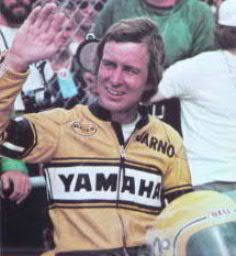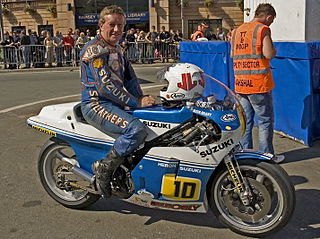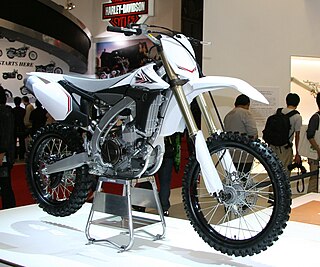
Motocross is a form of off-road motorcycle racing held on enclosed off-road circuits. The sport evolved from motorcycle trials competitions held in the United Kingdom.
Yamaha Motor Co., Ltd. is a Japanese mobility manufacturer that produces motorcycles, motorboats, outboard motors, and other motorized products. The company was established in the year 1955 upon separation from Nippon Gakki Co., Ltd. and is headquartered in Iwata, Shizuoka, Japan. The company conducts development, production and marketing operations through 109 consolidated subsidiaries as of 2012.

Stanley Michael Bailey Hailwood, was an English professional motorcycle racer and racing driver. He is regarded by many as one of the greatest racers of all time. He competed in the Grand Prix motorcycle world championships from 1958 to 1967 and in Formula One between 1963 and 1974. Hailwood was known as "Mike The Bike" because of his natural riding ability on motorcycles with a range of engine capacities.

Jarno Karl Keimo Saarinen was a Finnish professional Grand Prix motorcycle road racer. In the early 1970s, he was considered one of the most promising and talented motorcycle racers of his era until he was killed during the 1973 Nations Grand Prix in Italy. Saarinen's death led to increased demands for better safety conditions for motorcycle racers competing in the world championships. He remains the only Finn to have won a motorcycle road racing world championship. Saarinen was inducted into the F.I.M. MotoGP Hall of Fame in 2009.

Kent Andersson was a Swedish professional motorcycle road racer. He competed in Grand Prix motorcycle racing between 1966 and 1975, most prominently as a member of the Yamaha factory racing team where he was a two-time 125cc World Champion. Andersson was notable for being the only Swedish rider to win an FIM road racing world championship.

The Ducati singles were single cylinder motorcycles, made by Ducati from 1950 to 1974. Chief Engineer Fabio Taglioni developed a desmodromic valve system in these years, a system that opens and closes the valves using the camshaft, without the need for valve springs. This valve system has become a trademark feature of Ducati motorcycles.

William David Ivy was an English professional Grand Prix motorcycle racer from Maidstone, Kent. He died during practice for a race in East Germany.

Walter Villa was an Italian four-time Grand Prix motorcycle road racing world champion. He was known for his quiet, unassuming nature off the bike who became a ruthless competitor once the races began.

Kelvin Carruthers is an Australian former world champion Grand Prix motorcycle road racer and racing team manager. After his motorcycle riding career, he became race team manager for world championship winning riders Kenny Roberts and Eddie Lawson.

Mick Grant is an English former professional motorcycle road racer and TT rider. A works-supported rider for Norton, Kawasaki, Honda and Suzuki, he is a seven-time winner of the Isle of Man TT motorcycle race on various makes, including 'Slippery Sam', a three-cylinder Triumph Trident. The son of a coal miner, the soft-spoken, down-to-earth Yorkshireman from Wakefield, was a sharp contrast to the brash, playboy image presented by Londoner Barry Sheene during the 1970s.
Yvon Duhamel was a French Canadian professional motorcycle and snowmobile racer. A six-time winner of the White Trophy, the highest award in Canadian motorcycle racing, he was one of the most accomplished motorcycle racers in Canadian motorsports history. His motorcycle racing career spanned the transition from the 60 horsepower four-stroke motorcycles of the 1960s, to the 100 horsepower two-stroke motorcycles of the 1970s. Duhamel was a versatile rider competing in numerous motorcycle racing disciplines including; trials, motocross, ice racing, drag racing, flat track racing and most prominently in road racing as a member of the Kawasaki factory racing team.

Paul Smart was an English short circuit motorcycle road racer who later entered Grands Prix.

The Yamaha YZ450F is a four-stroke racing motocross bike built by Yamaha Motor Corporation. It was the successor to the previous YZ426F which was discontinued in 2003. It is credited by Cycle World and Dirt Rider magazines as the bike that started the four-stroke dirt bike revolution. The 2006 YZ250F and YZ450F were the first production motorcycles equipped with titanium suspension springs.
Charles Mortimer is an English former professional motorcycle short-circuit road racer and race-school instructor. He competed in the Grand Prix motorcycle road racing world championships from 1969 to 1979. He remains the only competitor to have won FIM Grand Prix races in the 125, 250, 350, 500 and 750 world championship classes.

Peter Williams was a British former professional motorcycle racer. He competed in Grand Prix motorcycle road racing from 1966 to 1973. He also competed at many levels on home short-circuit races. He raced many times on the Isle of Man TT course from 1966 to 1973. His father was Jack Williams who ran the Associated Motor Cycles (AMC) race department. Williams trained in mechanical engineering and introduced via racing alloy wheels, an innovation which is commonplace on today's road bikes, and was also an early pioneer of solo-motorcycle disc brakes.
Harris Performance Products are a British-based motorcycle racing and parts manufacturer. The business started in Roydon, Essex, England making replacement chassis for road racing, housing Yamaha TZ250/TZ350 engines using a monoshock rear suspension layout. It was absorbed in 2015 by a conglomerate specialising in vehicle production, based in India.

The TX750 is a two-cylinder standard motorcycle built by Yamaha. The bike was released in 1972. Significant reliability problems affected the engines in early bikes. Yamaha made several changes to solve the problems but the bike was withdrawn from most markets after 1974 and production stopped in the home market after 1975.

Yamaha XSR900 is a neo-retro standard Universal Japanese Motorcycle (UJM), which uses an 847 cc (51.7 cu in) transverse inline-triple engine. Introduced in 2016, the XSR900 is derived from Yamaha's MT-09.















